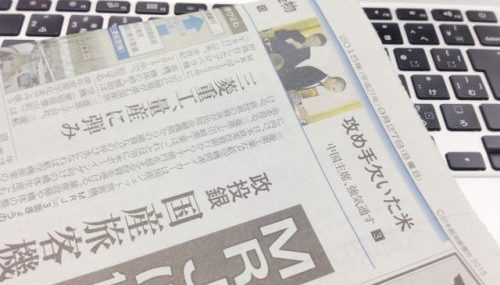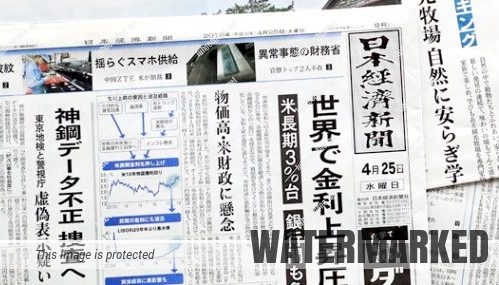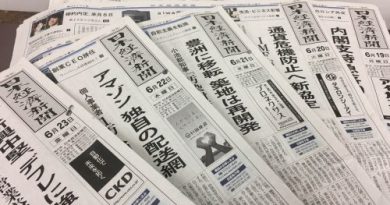Learn to read Japanese newspaper on Economy
In the previous posts, you have learned to read Japanese newspaper on Politics and Society with Learn Japanese Daily. In this post, we will move on to the next lesson: Learn to read Japanese newspaper on Economy. Let’s start!

Contents
Instruction
In order to read Japanese articles on topic: Economy, you can go to Japanese online newspapers such as: TV-Asahi News, Asahi Shinbun Digital, Yahoo! ニュース, TBS News… and select category 経済 (Keizai – Economy).
We recommend you to practice reading news on TV-Asahi News because the layout and the content of the news on this website are clear and easy to read.
How to practice reading: just like the previous post, you should skim the article to get the main idea first, then note down the unknown words and unknown sentences and look up the dictionary to clarify the meaning of each sentence. With the grammar structures that you have not learned yet, skip it to avoid disturbing the knowledge.
Regularly practice reading not only increases your reading skill but also helps you get used to the expression in Japanese writing. Therefore, try to pay attention to each element of the sentence (subject, adjective, verb…) to learn how to express naturally and accurately.
Vocabulary on economy in Japanese newspaper
Economy is a topic that has a lot of difficult and specialized words. If you are not knowledgeable, it will be difficult to understand the news. So let’s learn some common vocabulary on economy in Japanese newspapers!
経済産業省 (Keizaisangoushou) : Ministry of Economy, Trade and Industry (METI)
財務省 (Zaimushou) : Ministry of Finance
日銀 (Nichigin) : Bank of Japan (BOJ)
東京株式市場 (Toukyou kabushiki shijou) : Tokyo Stock Exchange
経平均株価 (Nikkei heikin kabuka) : Nikkei stock average
景気動向指数 (Keiki doukou shisuu) : Diffusion Index (DI)
国内総生産 (Kokunai souseisan) : Gross Domestic Product (GDP)
景気判断 (Keiki handan) : Economic assessment
世界経済 (Sekai keizai) : World economy, international economy
回復 (Kaifuku) : Restoration, rehabilitation, recovery
悪化 (Akka) : Corruption, growing worse
企業 (Kigyou) : Business, enterprise
経営 (Keiei) : Management
企業収益 (Kigyou shuueki) : Corporate profits
経済活動 (Keizai katsudou) : Economic activity
消費税 (Shouhizei) : Consumption tax
販売の低迷 (Hanbai no teimei) : Sales slump
成長率 (Seichouritsu) : Growth rate
値上げする (Neagesuru) : Raise the price
利益が半減する (Rieki ga hangensuru) : Profit halved
輸入する (Yunyuu) : Import
輸出する (Yushutsu) : Export
Some Grammar structures found in category: Economy in Japanese newspapers

Sentence 1
(Vる, Nの) + 予定です : plan to, intend to
来月1日から即席めんやポテトチップスなど身近な食品が次々と値上げされる予定です。
Raigetsu 1 nichi kara sokuseki men ya potetochippusu nado midjikana shokuhin ga tsugitsugi to neagesareru yotei desu.
The commodity prices such as instant noodles and potato chips are estimated to be raised one by one from the 1st of the following month.
Sentence 2
(Nの, Vる) + ため : Because, because of…
輸入する食品の関税が下がるため、値下げが期待されます。
Yunyuu suru shokuhin no kanzei ga sagaru tame, nesage ga kitaisaremasu.
Because the tariff on imported food is reduced, the price reduction is expected.
Sentence 3
(Vます, Aい, Aな) ~そうです。 : seems, seems like ~
キウイやブドウは関税が即時に撤廃されるため、家計にもメリットがありそうです。
Kiwi ya budou wa kanzei ga sokuji ni teppai sa reru tame, kakei ni mo meritto ga arisou desu.
Because the tariff on kiwi and grapes are immediately annuled, households seem to benefit from it.
Sentence 4
~ということです。 : I heard that, it is said that, it is written that
政府が製粉会社に売り渡す輸入小麦の価格を引き上げたことが主な要因で、人手不足などによる物流コストや人件費も高騰しているということです。
Seifu ga seifun kaisha ni uriwatasu yunyuu komugi no kakaku o hikiageta koto ga omona youin de, hitodebusoku nado ni yoru butsuryuu kosuto ya jinkenhi mo koutou shite iru to iu koto desu.
The main reason is that the government raised the price of imported wheat sold to flour mills companies, while the logistics costs and labor costs are rising due to the lack of labor.
Sentence 5
Vた + うえで : after, upon…
21日まで都内で開かれたTPP11の会合では、茂木経済再生担当大臣が保護主義の広がりに懸念を示したうえで「TPPを積極的に拡大したい」と述べ、新規加盟国を歓迎する姿勢を改めて示しました。
21 nichi made tonai de aka reta TPP 11 no kaigou de wa, Motegi keizai saisei tantou daijin ga hogo shugi no hirogari ni kenen wo shimeshita ue de “TPP o sekkyokutekini kakudai shitai” to nobe, shinki kamei kuni wo kangei suru shisei wo aratamete shimeshimashita.
At the TPP-11 meeting held in Tokyo until the 21st, after Mr. Motegi, Minister of Economic Regeneration, expressed concern about the spread of protectionism, he stated: “I would like to actively expand TPP”, and he also expressed again the welcome attitude to new member states.
Practice reading Japanese newspaper on economy
Let’s practice reading economic news on TV-Asahi News!

Title
6月も食品の値上げ続々 物流、原材料高騰止まらず
6 gatsu mo shokuhin no neage zokuzoku butsuryuu, genzairyou koutou tomarazu
Food prices continuing to rise in June – Logistics and raw materials prices soaring
Content
あすから6月、即席麺や油、ポテトチップスなど身近な食品が値上げされます。
Asu kara 6 gatsu, sokuseki men ya abura, potetochippusu nado midjikana shokuhin ga neagesaremasu.
From tomorrow on June, familiar foods such as instant noodles, oil and potato chips will increase in price.
日清食品、東洋水産、ハウス食品などの即席麺メーカー各社は、1日納品分または出荷分から即席の袋麺やカップ麺を3%から13%値上げします。
Nisshinshokuhin, Touyousuisan, Hausushokuhin nado no sokuseki men meekaa kakusha wa, 1 nichi nouhinbun matawa shukkabun kara sokuseki no fukuro men ya kappu men wo 3 paasento kara 13 paasento neage shimasu.
Instant noodles companies such as Nissin Food, House Food or Toyo Suisan will raise the price of cup noodles and bag noodles from 1 day delivery or shipment from 3% to 13%.
また、フジッコは昆布や豆製品、湖池屋とカルビーはポテトチップス、ハーゲンダッツジャパンはアイスクリームを値上げします。
Mata, Fujikko wa konbu ya mame seihin, koikeya to karubii wa potetochippusu, haagendattsu japan wa aisu kuriimu wo neage shimasu.
Besides, Fujicco will raise the price of kelp and bean products, Koikeya and Calbee will raise the price of potato snacks, Haagen Dazs Japan will raise the price of ice cream.
さらに、今月に続いて大型ペットボトル容器の飲料や食用油の値段も上がります。
Sarani, kongetsu ni tsudzuite ougata pettobotoru youki no inryou ya shokuyouyu no nedan mo agarimasu.
In addition, the prices of beverages and edible oils contained in large plastic bottles will also continue to rise this month.
各社は値上げの理由を「物流費や原材料費の高騰が続いているため」としていて、「自助努力では吸収することができない」と説明しています。
Kakusha wa neage no riyuu wo “butsuryuuhi ya genzairyouhi no koutou ga tsudzuite iru tame” to shite ite, “jijo doryoku de wa kyuushuusuru koto ga dekinai” to setsumeishite imasu.
Companies have explained the reason for the price increase: “Because of soaring logistics costs and raw material costs”, “Can’t deal that on their own.”
このほか、映画鑑賞料金や国際線の燃油サーチャージなども値上がりします。
Kono hoka, eiga kanshou ryoukin ya kokusaisen no nenyu saachaaji nado mo neagari shimasu.
Moreover, movie ticket prices and fuel surcharges for international flights are also rising.
Above is the content of the article : Learn to read Japanese newspaper on Economy. You should maintain the habit of reading Japanese newspaper to enhance your Japanese language proficiency and expand your knowledge. See you next time!
See more similar article in category : learn to read Japanese newspaper.


